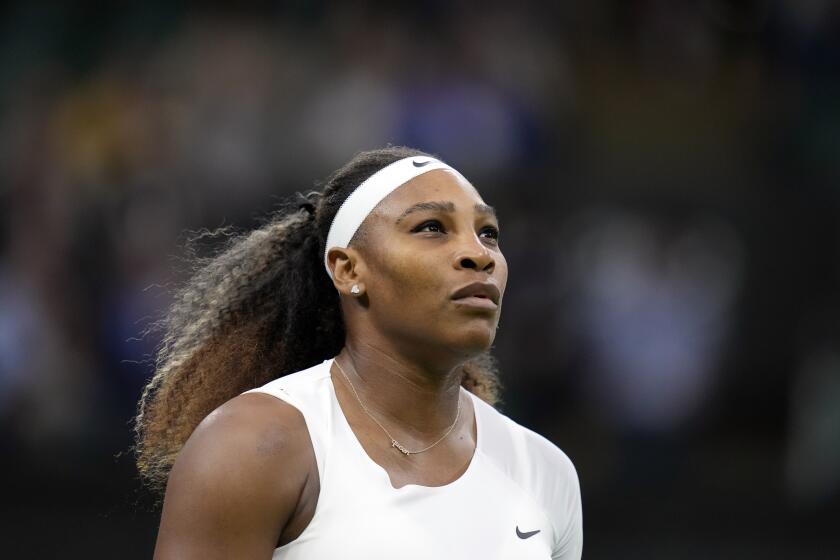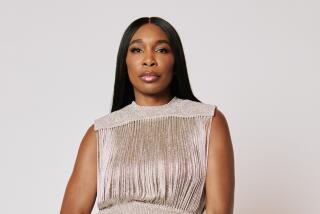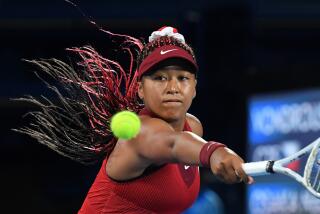Column: Serena Williams’ coach on recovery from her latest injury: ‘It’s going to work out’
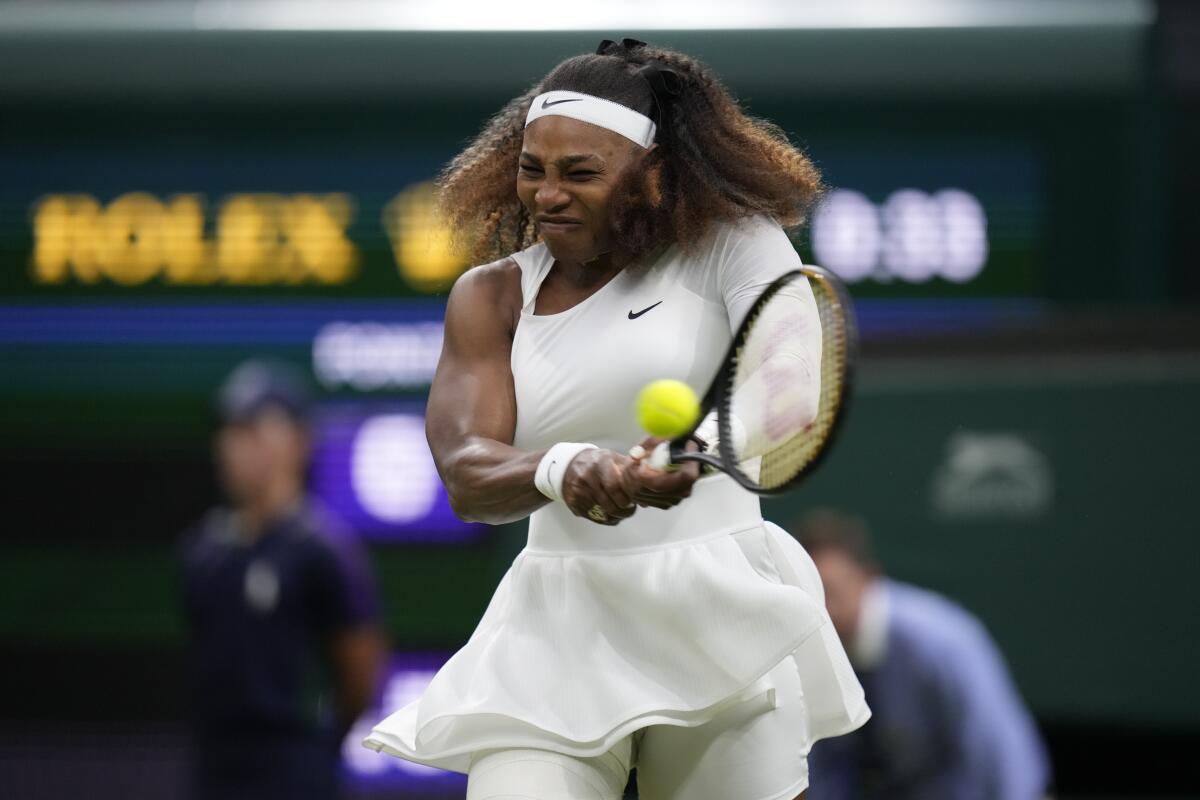
- Share via
In the end, it won’t really matter if Serena Williams wins another Grand Slam singles title and matches Margaret Court’s recognized record of 24.
Williams, who spent part of her childhood playing on public tennis courts in Compton alongside her sister Venus, has won so many championships so decisively — and on so many surfaces — that her superiority is beyond dispute. She’s chasing a number, not immortality. She earned immortality long ago, when her power game allowed her to dominate the court and redefine what women’s tennis could be.
The same drive that propelled her to the pinnacle of the sport has kept her going when her body balks under stress and strain, as it has done with sadly increasing frequency.
A hamstring injury she suffered at Wimbledon led her to withdraw from the U.S. Open, which will begin Monday in Flushing Meadows, N.Y. Her thigh was heavily taped during the French Open, where she lost in the round of 16, and she had to retire during the first set of her first-round match at Wimbledon after slipping and injuring her hamstring. It has become a familiar and frustrating refrain for Williams, who will turn 40 on Sept. 26.
“It’s been a tough year because out of the four Grand Slams, she’s been able to play only the Australian Open,” her coach, Patrick Mouratoglou said in a phone interview. “First of all, she’s sad because it’s a Grand Slam, and second it’s the home Grand Slam. So, two main reasons for being sad.”
Serena Williams is the latest big name to skip the U.S. Open, citing a torn hamstring for pulling out of the year’s last Grand Slam tournament.
For a long while, Williams did well at fending off time’s inevitable toll. She pulled off a near miracle to reach the finals of Wimbledon and the U.S. Open in 2018, and again in 2019 after enduring a perilous 2017 pregnancy that was complicated by a caesarean section and blood clots. She reached the semifinals of the Australian Open this year, where she lost to eventual champion Naomi Osaka.
But then came the injuries and the uncertainty over when she will return, much less whether she can return to top form. It’s no consolation, but she’s not alone in facing medical issues that have limited her match play: Roger Federer, newly 40, said two weeks ago he would need a third surgery on his right knee and will be out of tennis “for many months.” Rafael Nadal, a relatively spritely 35, withdrew from the U.S. Open because of a chronic foot problem.
Without them, the bright lights of New York will be undeniably dimmer. Each time they play is an occasion to be celebrated. Each time they withdraw or retire is a wish unfulfilled.
“Hopefully she goes out on her terms,” retired tennis star John McEnroe, now an ESPN commentator, said during a conference call held before Williams’ withdrawal from the Open. “Either way, she’s the greatest female player in my book that has ever played, one of the greatest athletes, period, that’s ever played. I don’t think she’s got to worry about whether she wins another one. But I’m sure that she would love to be able to do that, if possible.”
Mouratoglou said the calendar didn’t allow Williams enough time to heal and prepare for the Open after she slightly tore her hamstring at Wimbledon, and a setback cost her two additional weeks of recovery time. They were reluctant to push her for fear of doing long-term damage.
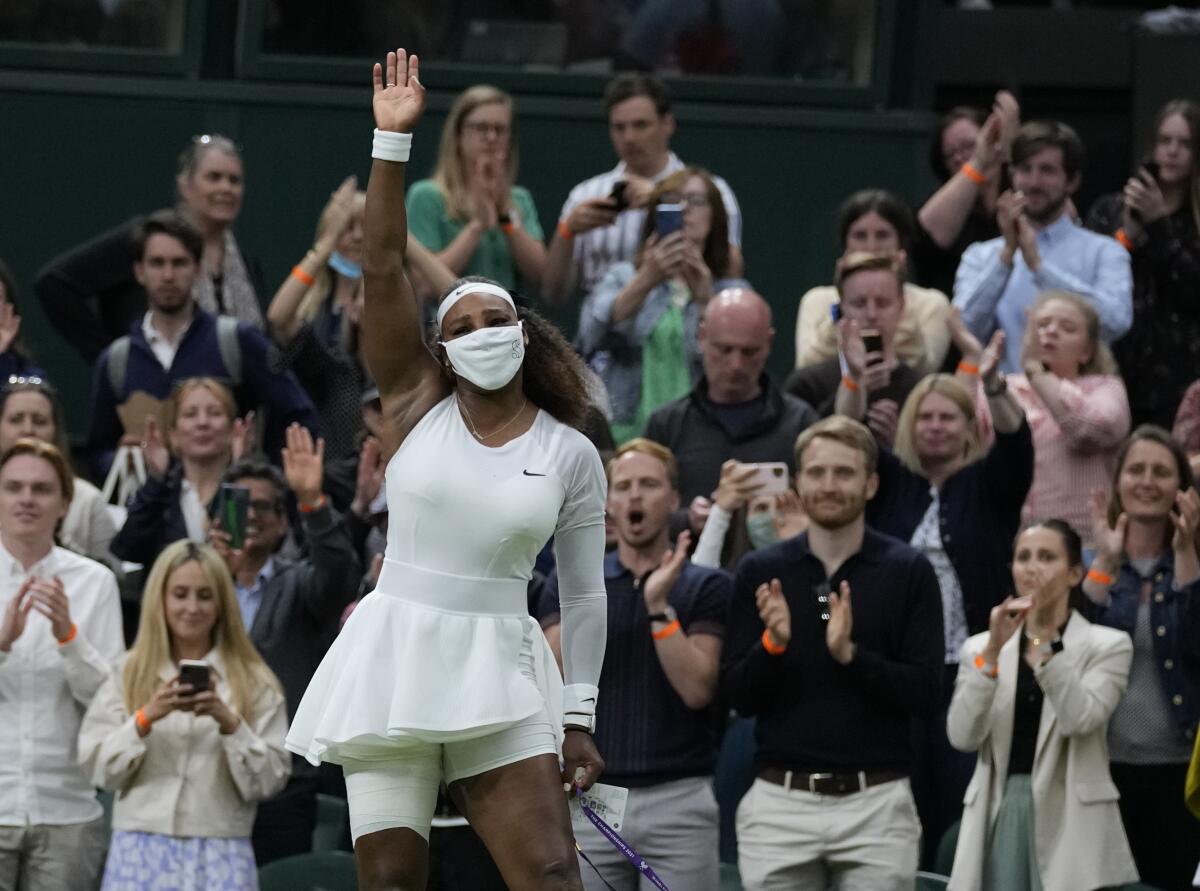
He says he believes she’s best left alone for now to adjust to missing the Open and accepting that her body will no longer obey her commands. “First of all, it is going to work out. We know it’s just a question of weeks,” he said. “We know also that if the U.S. Open would take place maybe three weeks later, she would be ready. So it’s just a question of time, so no particular stress there.
“The only question is what’s next, and in order to answer that question I think it’s important to digest what just happened because it’s still a big shock and a disappointment for her, and we decided that we’ll take a bit of time and within the next month, we will sit down again and discuss about the future.”
That could put the BNP Paribas Open at Indian Wells, which was rescheduled for Oct. 4-17, on her radar. “For the moment all the options are possible,” Mouratoglou said. “We have to just know what are the goals for the future and then, when we know what the goals are, we can go with a plan. Without a goal we cannot make a plan.”
He acknowledged that he didn’t ask her if those goals include returning to elite level play. “Again, we didn’t speak about it, so it’s difficult for me to answer that question,” he said. “We didn’t discuss it because we had a plan, and that was to play this U.S. Open, and we were focusing on that. And then we just discussed playing it or not and we took the decision.
“And again, you know, to think about the future, whether it’s with or without tennis, I don’t know, she needs to again digest and take some distance with tennis to think right. She needs that time. She will get that time, and then we’ll talk.”
Filmmaker Garrett Bradley explains how she earned the tennis champion’s trust: “I tried to reinforce that I wasn’t press as much as possible.”
McEnroe, who retired from tour singles play at 33, marveled at Williams’ longevity but wondered if she has experienced the duress he felt late in his career. “I noticed at least with myself that the older I got in a way I felt more pressure and felt like my days were numbered. It ended up, like, hurting me as opposed to that experience you can use to your advantage,” he said.
“It seems that that wasn’t an issue until maybe Serena came back from having her child, maybe sensing she wasn’t going to have a lot of opportunities. Even though she’s had four [Slam final berths], she wasn’t able to play to the level that she normally plays at. Why that was, that’s difficult to say.”
Given the depth on the women’s tour — which is loaded with players who consider her an idol — it’s difficult to imagine Williams will win another Slam singles title. All good fortune to her while she chases her dreams, but she should know she doesn’t have to chase a record to be considered the greatest in the game. She’s already there, proudly, fiercely, immovably.
More to Read
Go beyond the scoreboard
Get the latest on L.A.'s teams in the daily Sports Report newsletter.
You may occasionally receive promotional content from the Los Angeles Times.

